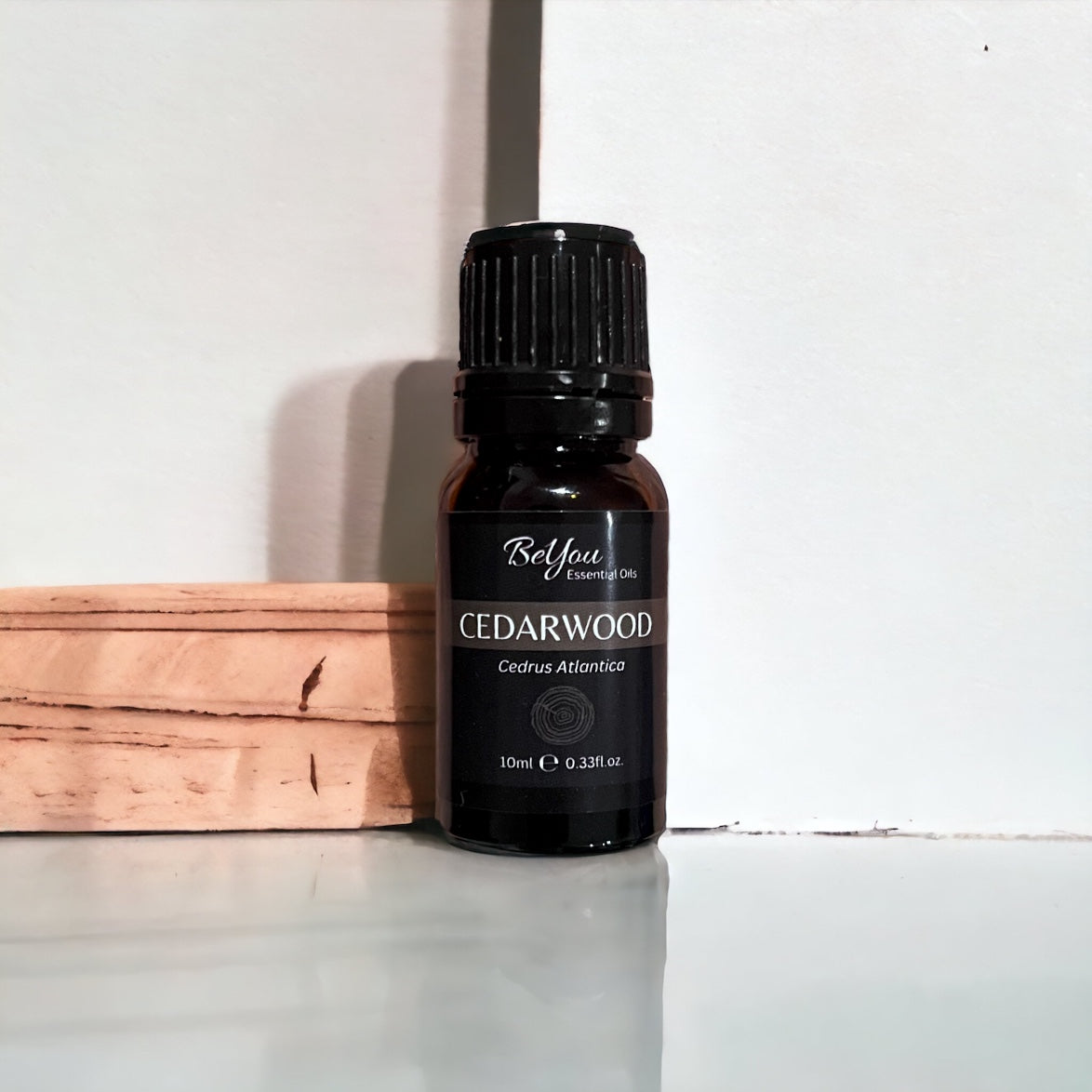Cedarwood Pure Essential Oil
Cedarwood Pure Essential Oil
Low stock: 4 left
Couldn't load pickup availability
DESCRIPTION
DESCRIPTION
Cedarwood Essential Oil is derived from the wood of the cedar tree and offers a range of benefits for both the mind and body. It is often used for its calming properties, promoting relaxation and reducing feelings of stress and anxiety. Additionally, cedarwood oil is valued for its ability to support respiratory health, alleviate congestion, and soothe coughs. With its antimicrobial properties, it can also help create a cleaner environment by combating bacteria and fungi.
Benefits:
- Relaxation and Stress Relief: Cedarwood oil has a calming aroma that can help reduce stress, anxiety, and promote a sense of tranquility.
- Sleep Support: Its soothing properties make it a popular choice for promoting a restful night's sleep and combating insomnia.
- Respiratory Support: Cedarwood oil can assist in clearing congestion and supporting healthy respiratory function.
- Skin and Hair Care: It is often used in skincare products to help soothe and moisturize the skin, alleviate dryness, and promote a healthy scalp and hair.
- Insect Repellent: Cedarwood oil has natural insect-repellent properties and can be used to deter mosquitoes, fleas, and other pests.
- Antimicrobial properties: Cedarwood Essential Oil possess antimicrobial properties which makes it effective in inhibiting the growth of various microorganisms, including bacteria, fungi, and certain types of viruses. It is often used in natural cleaning products, as well as in skincare formulations to help prevent or combat microbial infections.
PRODUCT DETAILS
PRODUCT DETAILS
Botanical Name: Cedrus atlantica (Cedarwood) Oil
Derived from: Wood
Origin: Morocco
Extraction: Steam distilled essential oil
Note: Base note, fixative
Aroma: Woody, warm, earthy
- Vegan
- Non-GMO
- Not tested on animals
- Halal
- No carrier oils, 100% pure essential oil
Size: 10ml
DIRECTIONS FOR USE
DIRECTIONS FOR USE
HOW TO USE:
- Aromatherapy: Diffuse Cedarwood oil to create a relaxing and grounding atmosphere. It can help enhance meditation practices and promote a peaceful environment.
- Topical Application: Dilute Cedarwood oil with a carrier oil, such as coconut or jojoba oil, and apply it topically to the skin. It can be used for massage, to soothe skin irritations, or to promote a healthy scalp.
- Bathing: Add a few drops of Cedarwood oil to a warm bath to enjoy its relaxing aroma and potential skin benefits.
- DIY Products: Cedarwood oil can be incorporated into homemade soaps, lotions, and candles for its pleasant scent and potential therapeutic properties.
BLENDS WITH
BLENDS WITH
Blends Well With:
Cedarwood oil blends well with several essential oils, including:
- Lavender: Creates a soothing and calming blend, ideal for relaxation and promoting sleep.
- Bergamot: Combines for a refreshing and uplifting aroma, promoting a positive mood.
- Frankincense: Enhances spiritual and grounding qualities, creating a balanced blend.
- Clary Sage: Complements Cedarwood's calming properties, ideal for relaxation and stress relief.
SAFETY PRECAUTION
SAFETY PRECAUTION
Safety Precautions:
- Cedarwood oil is generally safe for most individuals when used as directed.
- It is recommended to perform a patch test before applying Cedarwood oil topically to check for any skin sensitivities or allergies.
- Avoid direct contact with the eyes, inner ears, and sensitive areas of the body.
- Keep Cedarwood oil out of reach of children and pets.
- If you have specific health concerns, are pregnant, nursing, or taking medications, it's advisable to consult a healthcare professional before using Cedarwood oil.

FAQs
-
What are essential oils?
Essential oils are highly concentrated plant extracts that capture the natural fragrance and beneficial properties of plants. They are typically obtained through processes like steam distillation or cold-pressing of various plant parts such as leaves, flowers, stems, or roots. Essential oils are known for their aromatic qualities and are commonly used in aromatherapy, personal care products, and natural remedies. -
How are essential oils used?
Essential oils can be used in several ways. Here are a few common methods:
- Aromatherapy: Inhalation of essential oils using diffusers, steam inhalation, or adding a few drops to a bowl of hot water.
- Topical application: Diluting essential oils with carrier oils (such as coconut or jojoba oil) and applying them to the skin for massage or skincare purposes.
- Internal consumption: Some essential oils are safe for internal use, but it is crucial to consult a qualified professional before ingesting them, as not all oils are suitable for internal consumption.
-
What are the potential benefits of essential oils?
Essential oils are believed to offer a range of potential benefits, but it's important to note that scientific research on their effectiveness is still evolving. Some commonly cited benefits include:
- Aromatherapy for relaxation, stress relief, and mood enhancement.
- Skin and hair care: Many essential oils are used in skincare products for their potential antimicrobial, anti-inflammatory, and soothing properties.
- Natural cleaning: Some essential oils possess antimicrobial properties and can be used as natural alternatives for household cleaning products.
- Potential respiratory support: Certain essential oils, such as eucalyptus or peppermint, are known for their potential respiratory benefits when inhaled.
-
Are there any risks or precautions associated with essential oils?
While essential oils are generally safe when used properly, there are a few important considerations:
- Skin sensitivity: Some essential oils can cause skin irritation or allergic reactions, especially when used undiluted or on sensitive skin. Always perform a patch test and dilute oils before applying them topically.
- Inhalation precautions: Not all essential oils are safe for inhalation, especially for individuals with respiratory conditions or sensitivities. Certain oils may trigger allergies or respiratory distress.
- Internal use: Internal consumption of essential oils should only be done under the guidance of a qualified professional. Many oils are toxic when ingested, and improper use can lead to adverse effects.
- Pregnancy and children: Some essential oils are not safe for use during pregnancy or on young children. It's crucial to consult healthcare professionals or certified aromatherapists for guidance in these situations.
Remember, it's always wise to consult with a healthcare professional or aromatherapist before using essential oils, especially if you have any underlying health conditions or concerns.
5. What is your extraction/collection process?
Refer to our Blogs for a detailed explanation about our Extraction and Collection process.
6. Are the plants sprayed with any chemicals which may lead to being included in the process of collecting the oil?
No, as our suppliers are certified there is no chemicals or pesticides being used on the plants, which are confirmed as each batch is analysed by microbiologist for the presents of bio-hazardous micro-organisms (such as bacteria and mould), heavy metals and pesticides.
7. Are the oils 100% organic as well as not diluted with fragrances or anything other than the plant itself?
Yes, all our Essential and Absolute oils are 100% organic, pure, with no carrier oils added, or fragrances.



